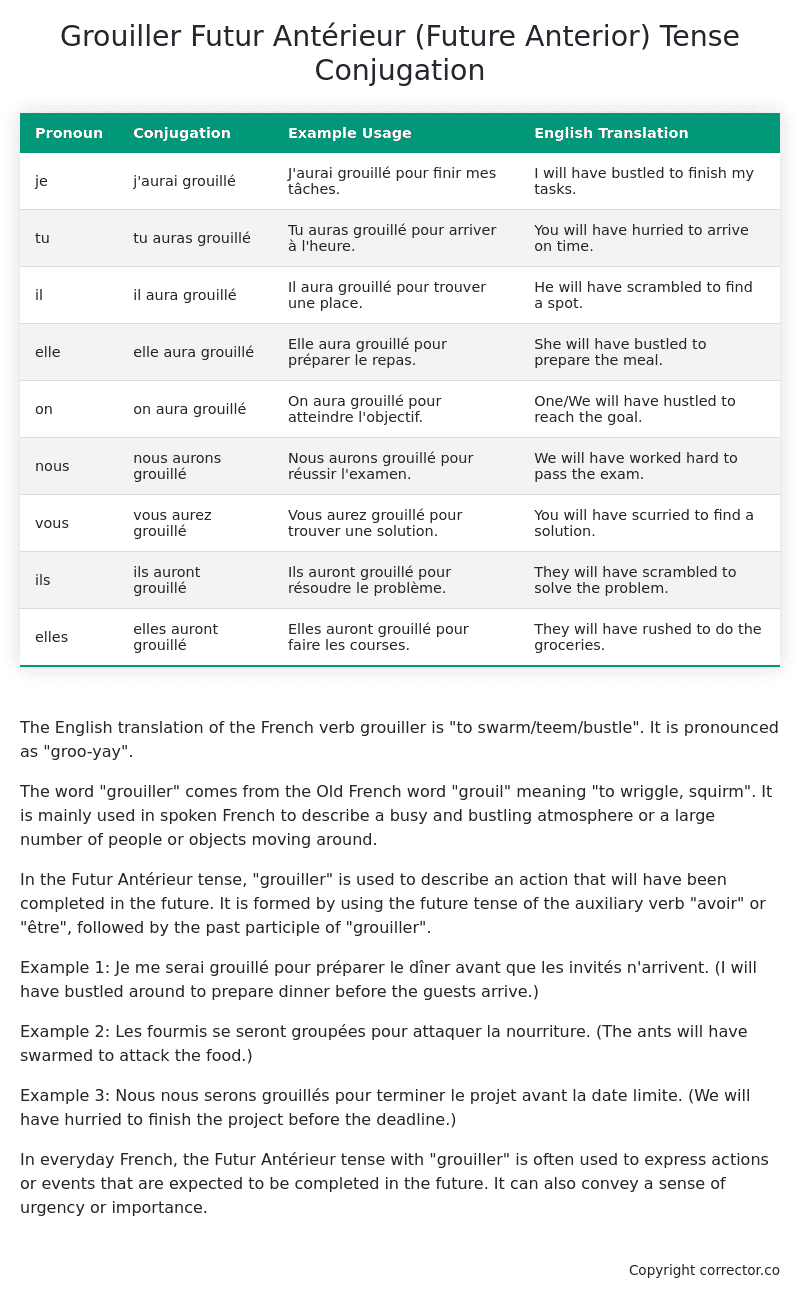Futur Antérieur (Future Anterior) Tense Conjugation of the French Verb grouiller
Introduction to the verb grouiller
The English translation of the French verb grouiller is “to swarm/teem/bustle”. It is pronounced as “groo-yay”.
The word “grouiller” comes from the Old French word “grouil” meaning “to wriggle, squirm”. It is mainly used in spoken French to describe a busy and bustling atmosphere or a large number of people or objects moving around.
In the Futur Antérieur tense, “grouiller” is used to describe an action that will have been completed in the future. It is formed by using the future tense of the auxiliary verb “avoir” or “être”, followed by the past participle of “grouiller”.
Example 1: Je me serai grouillé pour préparer le dîner avant que les invités n’arrivent. (I will have bustled around to prepare dinner before the guests arrive.)
Example 2: Les fourmis se seront groupées pour attaquer la nourriture. (The ants will have swarmed to attack the food.)
Example 3: Nous nous serons grouillés pour terminer le projet avant la date limite. (We will have hurried to finish the project before the deadline.)
In everyday French, the Futur Antérieur tense with “grouiller” is often used to express actions or events that are expected to be completed in the future. It can also convey a sense of urgency or importance.
Table of the Futur Antérieur (Future Anterior) Tense Conjugation of grouiller
| Pronoun | Conjugation | Example Usage | English Translation |
|---|---|---|---|
| je | j’aurai grouillé | J’aurai grouillé pour finir mes tâches. | I will have bustled to finish my tasks. |
| tu | tu auras grouillé | Tu auras grouillé pour arriver à l’heure. | You will have hurried to arrive on time. |
| il | il aura grouillé | Il aura grouillé pour trouver une place. | He will have scrambled to find a spot. |
| elle | elle aura grouillé | Elle aura grouillé pour préparer le repas. | She will have bustled to prepare the meal. |
| on | on aura grouillé | On aura grouillé pour atteindre l’objectif. | One/We will have hustled to reach the goal. |
| nous | nous aurons grouillé | Nous aurons grouillé pour réussir l’examen. | We will have worked hard to pass the exam. |
| vous | vous aurez grouillé | Vous aurez grouillé pour trouver une solution. | You will have scurried to find a solution. |
| ils | ils auront grouillé | Ils auront grouillé pour résoudre le problème. | They will have scrambled to solve the problem. |
| elles | elles auront grouillé | Elles auront grouillé pour faire les courses. | They will have rushed to do the groceries. |
Other Conjugations for Grouiller.
Le Present (Present Tense) Conjugation of the French Verb grouiller
Imparfait (Imperfect) Tense Conjugation of the French Verb grouiller
Passé Simple (Simple Past) Tense Conjugation of the French Verb grouiller
Passé Composé (Present Perfect) Tense Conjugation of the French Verb grouiller
Futur Simple (Simple Future) Tense Conjugation of the French Verb grouiller
Futur Proche (Near Future) Tense Conjugation of the French Verb grouiller
Plus-que-parfait (Pluperfect) Tense Conjugation of the French Verb grouiller
Passé Antérieur (Past Anterior) Tense Conjugation of the French Verb grouiller
Futur Antérieur (Future Anterior) Tense Conjugation of the French Verb grouiller (this article)
Subjonctif Présent (Subjunctive Present) Tense Conjugation of the French Verb grouiller
Subjonctif Passé (Subjunctive Past) Tense Conjugation of the French Verb grouiller
Subjonctif Imparfait (Subjunctive Imperfect) Tense Conjugation of the French Verb grouiller
Subjonctif Plus-que-parfait (Subjunctive Pluperfect) Tense Conjugation of the French Verb grouiller
Conditionnel Présent (Conditional Present) Tense Conjugation of the French Verb grouiller
Conditionnel Passé (Conditional Past) Tense Conjugation of the French Verb grouiller
L’impératif Présent (Imperative Present) Tense Conjugation of the French Verb grouiller
L’infinitif Présent (Infinitive Present) Tense Conjugation of the French Verb grouiller
Struggling with French verbs or the language in general? Why not use our free French Grammar Checker – no registration required!
Get a FREE Download Study Sheet of this Conjugation 🔥
Simply right click the image below, click “save image” and get your free reference for the grouiller Futur Antérieur tense conjugation!

Grouiller – About the French Futur Antérieur (Future Anterior) Tense
Construction
Common Everyday Usage Patterns
Interactions with Other Tenses
For example
Summary
I hope you enjoyed this article on the verb grouiller. Still in a learning mood? Check out another TOTALLY random French verb conjugation!


